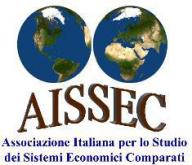26 | JANUARY 2024
OEET organized its 9th Workshop on 14-15, December 2023 at Campus Luigi Einaudi, University of Turin, titled “Economic effects of climate change and energy transition on emerging countries”.
The Workshop aimed at analyzing the current and expected impacts of climate change on emerging countries. On the one hand, all the countries (but mainly low-income countries) are plagued by its detrimental effects on the environment, which harm their inhabitants as producers (especially in the agricultural sector through famines, so that people lose job and income), and also as consumers (through increased prices), often pushing them to internal unrests, wars or migration. On the other hand, some emerging countries (mainly higher income countries) benefit from the adoption of energy transition policies (pushed by climate change) that bolster their competitiveness or allow them to exploit the surging demand for raw materials spurred by this energy shift. Furthermore, the situation becomes more difficult as high income countries are adopting energy and industrial policies strongly based on protectionist measures, which impact and modify international markets.
by Andrea Pronti, Elena Vallino and Massimiliano Mazzanti[1]
Robust and effective water management policies will be crucial for water security and global water issues in the next future. An efficient and socially fair use of water resources is indeed important for sustainable development, in particular if considered within the water-food-climate nexus theoretical framework. Beside the necessary condition of having availability of water resources, water governance and management are crucial elements for ensuring efficient, sustainable and productive water use for human communities. In our research work we aim at exploring at an empirical level the determinants of the diverse quality levels of water governance in the different countries.
By Giorgio Brosio, Juan Pablo Jiemenez and Ignacio Ruelas[1]
Decarbonization and its fiscal implications
This short text aims at exploring the fiscal, more precisely the revenue impact, between and within countries, coming from changing trends of the production and use of natural resources deriving from decarbonization and energy transition policies. For illustrative purposes, it will refer to the case of some Latin America countries. The region is emerging as a leading producer of minerals demanded by decarbonization. At the same time, it is also a primary producer of fossil fuels. These circumstances produce winners and losers at the national level. There are also winners and losers at the subnational level since most Latin American countries share natural resource revenues between the central and the subnational levels of government.
Our work is based on a few political assumptions and some technological, economic, and fiscal facts, subject to variation over time. Assumptions refer to the commitment that countries took at COP21 held in 2015 in Paris to hold the increase in the global average temperature to well below 2°C above preindustrial levels and ideally to 1.5°C to avert catastrophic outcomes. COP28 held in late 2023 in Dubai confirmed this commitment, engaging countries to curb the production and use of fossils, although with several loopholes. It implies cutting greenhouse gas emissions to as close to zero as possible, with the remaining emissions captured.
Achieving final targets requires, from the technological point of view, shifting from the simple addition of new sources of energy to the full substitution of fossil fuels i.e. enacting an energy transition. In turn, investment in clean renewable energies and their use requires expanded production of critical minerals.
The final targets can be achieved with a combination of regulatory policies; granting of subsidies and public investments (all impacting on public expenditure); markets for trade of emissions and issuing of emissions permits; and finally of tax instruments, such as carbon taxes and specific taxes on fuels. There is a large space for substitution and complementing these policies. Our focus is quite narrow, but critical for producers of natural resources since it looks at the final impact of these policies and reactions to them by firms and individuals on their public revenues.
By Andrea Pronti, Eduardo Zegarra, Dolores Rey Vicario and Anvil Graves[1]
Global agricultural trade and export specialization has transformed the geography and the economy of many low-middle income countries, which have become major players within global food value chains. One of these is Peru, which is now a global leader in the export of water-intensive crops such as asparagus and grapes, at the expense of scarce water resources and with a heavy reliance on groundwater (Salmoral et al., 2020). Whilst this agro-export boom has supported employment, rural development and economic growth for some people, significant social and environmental challenges for others limit its sustainability. In particular, heavy abstraction for irrigation is likely to increase pressure on groundwater reserves, particularly given the ever increasing demand for water intensive export crops (Schwarz and Mathijs, 2017). One of the areas where these conflicts are starting to manifest is the Ica Valley in Peru, which after liberalisation of the agricultural land market has seen large agricultural corporations focused on international crop production (mainly asparagus, grapes, onions and avocados) acquiring large areas of land from smallholders (Williams and Murray, 2019). These corporations have developed large areas of intensive irrigation leading to prolonged water crisis for other stakeholders (Muñoz, 2016; Schwarz and Mathijs, 2017; Williams and Murray, 2019). Whilst drip irrigation systems have been deployed to increase productivity, the high value of the crops produced has led to a ‘rebound effect’ (Berkhout et al., 2000; Sorrell and Dimitropoulos, 2008) since the water savings obtained have encouraged expansion of the irrigated area for high value crops, such as asparagus and grapes, increasing the overall withdraw of groundwater rather than conservation of the water resource itself (Berbel et al., 2015; Berbel and Mateos, 2014).
By Xieshu Wang[1]
Introduction
China is the only country that has so far developed a full value chain of electric vehicle (EV) manufacturing, from raw material production, battery making, EV assembly to end-of-life recycling. It’s largely the merit of strong and comprehensive industrial policies, covering multiple aspects from raw material management, general emission standards, EV technical requirements, taxation exemptions, practical advantages to charging infrastructure, public fleet, demonstration zones, etc. These policies have evolved with the market status, following the Chinese way of ‘learning from experimentation’ (Roland, 2000; Qian, 2002; Wang and Yang, 2023), constantly adapting to changing situations. Industrial data about the Chinese EV market’s different dimensions illustrate how effective the EV industry policy has been. To better understand the indispensable role of the industrial policy, we need to trace the origin of China’s EV industry policy and analyse the different types of measures adopted at different government levels. We see that the industrial policies have gone through several phases, showing important changes and evolutions, with the goal to not only reinforce China’s leadership in the emerging global EV industry but also accelerate the decarbonisation of its economy.
by Augusto Ninni[1]
As energy accounts for around 2/3 of GHG (greenhouse gases) emissions, we focalize our analysis about the effects of mitigation policies against climate change on energy, particularly electrical energy: so our key issue is energy transition.
The energy trilemma
Since few years the choice between energy sources and more generally energy policies are influenced in most countries by the energy trilemma[2]. That means the design and the assessment of national energy policy must take into account – possibly in the same time - three main issues: affordability-sustainability-reliability.
Affordability means taking into account the cost of energy sources. Even if energy expenditure does not represent the highest cost item for every industry[3] it affects every of them, so that its total weight is very relevant. So, one of the most important changes in the very recent years is the cost reduction of the renewable energies, at least in the generation of electrical energy, to levels lowest than the fossil fuels to make them competitive with the fossil fuels, removing the “grid parity” issue.
Our activities
-
AFRICA: DEVELOPMENT, SUSTAINABILITY AND GREEN TRANSITION
Tuesday, January 27th 9.45 – 17.00 Aula SV002, Università Cattolica del Sacro Cuore; Via San...









